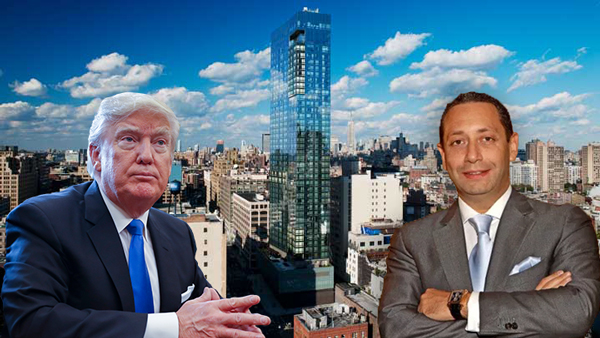In the spring of 2009, Donald Trump Jr. told The Real Deal that sales for the Trump Soho condo-hotel project had hit 55 percent. In fact, according to a sworn affidavit by a Trump partner filed with the New York Attorney General, only 15.8 percent of units were in contract by March 2010.
In August 2010, buyers at the under-construction skyscraper decided to sue the developers of Trump Soho, including Donald Trump, Don. Jr., Ivanka Trump, the Sapir Organization, Bayrock Group and others. They alleged they had been lied to about sales figures in order to entice them into buying at the building. For a time, their lawyer, Adam Leitman Bailey, cooperated with Manhattan Attorney Cyrus Vance, Jr. in a criminal investigation into whether the lies constituted securities fraud.
A new investigation published Wednesday by ProPublica, the New Yorker and WNYC, gives a behind-the-scenes look at how the Trump Soho case was dropped. It includes an unreported role performed by Trump attorney Marc Kasowitz, who had made a campaign contribution to Vance before attempting to persuade him to drop the investigation (Vance reimbursed the funds). Kasowitz also made a contribution to Vance six months after the case was dropped. (That money will also be returned, Vance said.)
Related: A condo boom that doesn’t add up
But in November 2011, Bailey sent a letter to Vance in which he informed the DA that his clients had “amicably settled the litigation” against the defendants. As part of the settlement, Bailey wrote, “we acknowledge that the Defendants have not violated the criminal laws of the State of New York or the United States.”
Bailey’s letter, which was reviewed by The Real Deal, and is published in full here, would have made it very difficult for Vance to land a guilty verdict against Trump and his partners. Vance told ProPublica/New Yorker/WNYC that he had never before seen a letter where plaintiffs in a civil case asserted that no crime had been committed.
“I don’t think I’d ever received a letter like it,” he said, calling it a “significant and important” communication.
Vance’s communications director, Joan Vollero, gave TRD the following statement on Wednesday: “This was a two-year investigation that never produced sufficient evidence to support a criminal prosecution. During the investigation, the luxury apartment purchasers reversed course and took the position that the sellers had not committed any crime against them. No outside attorney influenced any decision in this matter.”
In an interview Wednesday, Bailey said that “when we settled, when we received 90 percent of the money back for my clients, all the plaintiffs agreed that they would no longer speak to the DAs office.” He insisted that the connection made in the WNYC/New Yorker/ProPublica investigation between Kasowitz and the dropping of the investigation has “no connection to reality.”
“All they [my clients] wanted was to be made whole and the money they put down returned,” he added.

Trump Soho at 246 Spring Street, Donald Trump and Felix Sater
The Trump Soho saga became a watershed case in the world of condo litigation. As part of an investigation by TRD last year, condo attorneys said that developers are now far more reluctant to disclose sales information to buyers’ attorneys, for fear of legal repercussions if they turn out to be wrong.
In the investigation, TRD found that many developers often provided misleading numbers when it came to condo sales, creating a false sense of robust business at their projects. That impression can hurt the market, experts said, by making buyers feel they need to act fast, and hurt competing projects.
Bailey feels like the decision to drop the criminal investigation could have shaped the presidential race.
“If I had broken my confidentiality and spoken to the press, Trump may never have been President of the United States,” he said. “But when I sign an agreement, I will always put that over everything in the world. A settled case is going to stay settled.”
